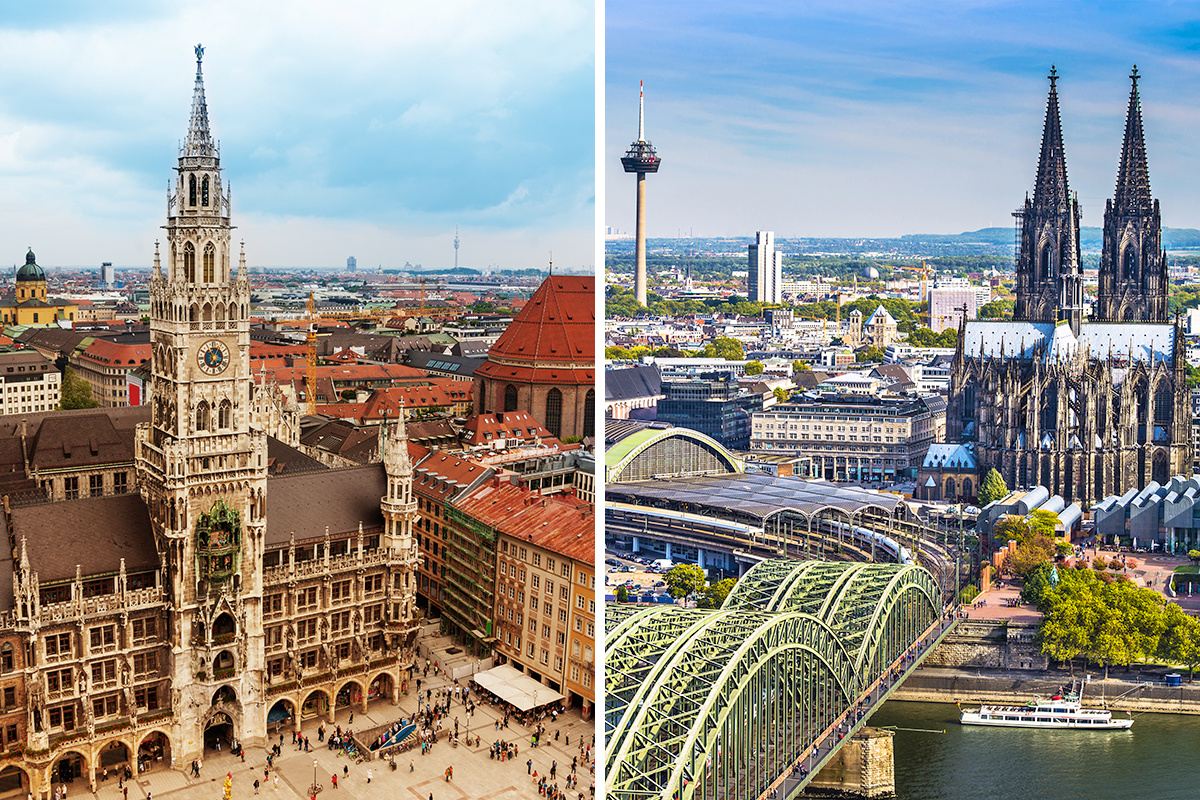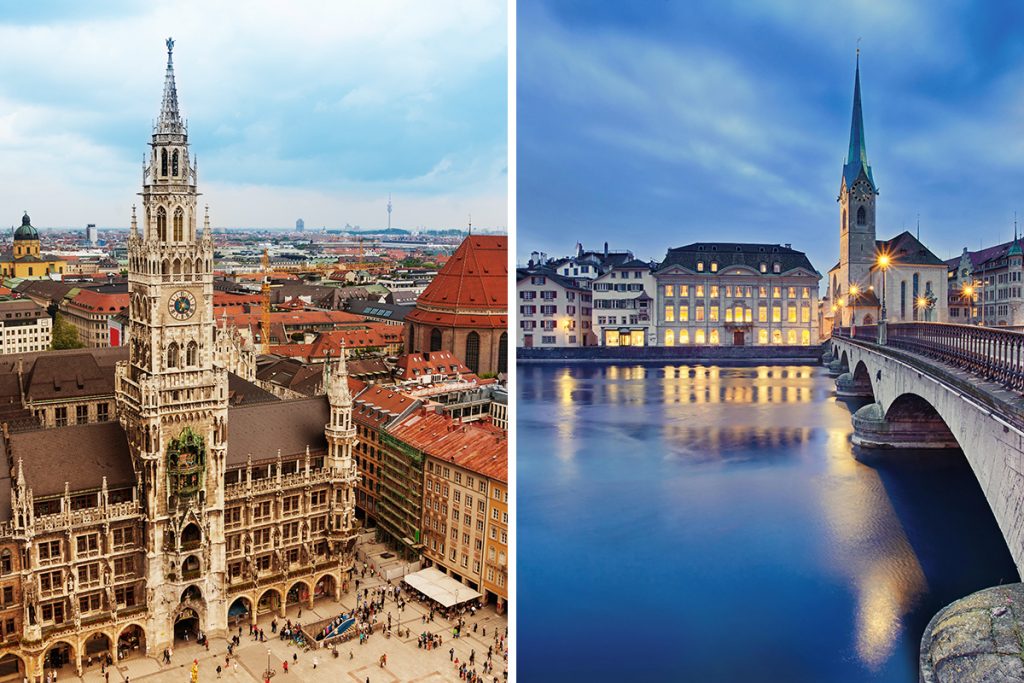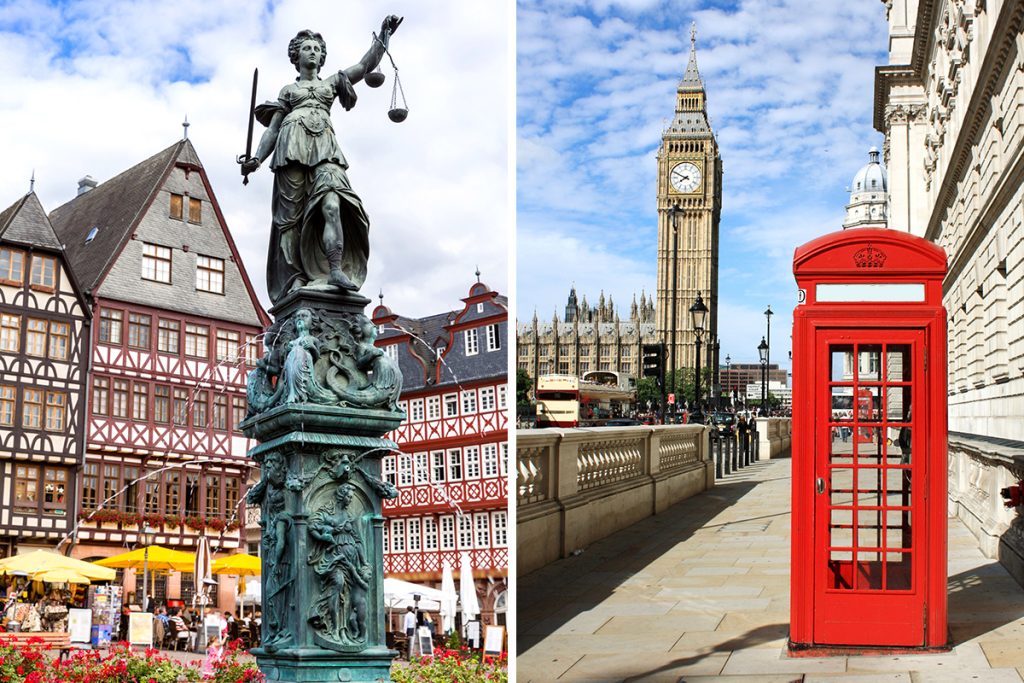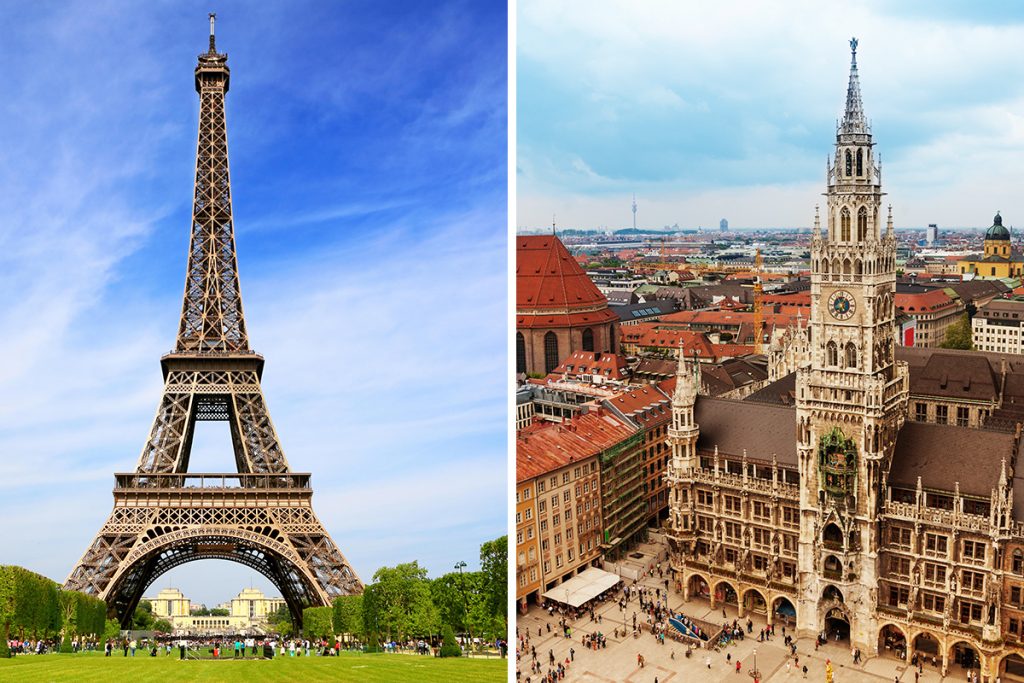Are you ready to embark on a thrilling journey through time and culture? Curious to find out how Munich and Cologne’s histories have shaped their present identities? This could be the beginning of your next great adventure. So buckle up, it’s time to explore!
History & Culture
You’re standing at a crossroads. One path leads to Munich, a city steeped in centuries of history, where tradition meets innovation. The other path takes you to Cologne, a city of age-old customs and contemporary creativity. But how do these cities differ in their history and culture?
In Munich, history is at your fingertips. Founded in the 12th century, Munich has been shaped by Bavarian monarchs, World Wars, and the post-war era. Walking through the city, you’ll find architectural marvels like the Nymphenburg Palace and the iconic Frauenkirche.
The city’s traditions are deeply ingrained, often coming to life during Oktoberfest and the Christkindlmarkt. From the sophisticated sounds of classical music echoing from the Bavarian State Opera to the animated chatter in bustling beer halls, Munich embodies a unique blend of the old and new.
On the flip side, Cologne is a city with deep Roman roots dating back to the 1st century AD. The city’s history is visible in its stunning architecture, including the famed Cologne Cathedral, a UNESCO World Heritage Site.
Its culture is as diverse as its history, with the Karneval – a festive season of parades, balls, and stage shows – taking center stage. The city’s dynamic arts scene, ranging from avant-garde exhibitions to street art, reflects Cologne’s enduring spirit of creativity.
Comparing Munich and Cologne, you’ll find that both cities offer rich historical experiences and vibrant cultural scenes. Each city tells its own unique story, inviting you to delve deeper and discover its secrets. Munich’s tradition-steeped lifestyle intertwined with modern elements contrasts with Cologne’s rich Roman history and creative spirit.
In summary, your choice between Munich and Cologne can be influenced by what aspect of history and culture resonates with you the most. Do you prefer Munich’s blend of royal heritage and modernity or Cologne’s ancient history and diverse arts scene? Remember, it’s not just about seeing a city; it’s about experiencing its soul. So, where will your adventure take you?
Attractions & Activities
Imagine an epic showdown between the attractions and activities in Munich and Cologne. Both are phenomenal cities, each with unique offerings that attract millions of tourists annually. Let’s dive into the details to better understand what each of these two magnificent German cities has to offer.
Munich is renowned for its breathtaking architecture, museums, and parks. The imposing Nymphenburg Palace with its stunning Baroque architecture, beautiful gardens, and extensive museum collections is an absolute must-see. Then there’s the sprawling English Garden, larger than Central Park in New York, where you can enjoy a pleasant stroll, picnic, or even surf in the Eisbach River.
Don’t forget about the city’s notable museums such as the Deutsches Museum, one of the world’s largest science and technology museums, and the Alte Pinakothek, a haven for European art enthusiasts.
Cologne, on the other hand, has its own set of appealing attractions. The colossal Cologne Cathedral is an undeniable highlight. It took over six centuries to build this towering Gothic masterpiece! Another gem is the Chocolate Museum located on the Rhine River, which takes you on a delicious journey through the history of chocolate. For history buffs, the Roman-Germanic Museum provides a comprehensive insight into the city’s Roman history.
In terms of activities, both cities offer unique opportunities. Munich is famous for its bike-friendly infrastructure, so a bike tour around the city is a perfect way to explore. On the other hand, Cologne offers scenic boat tours along the Rhine River, providing stunning views of the city skyline and historic landmarks.
To sum up, both Munich and Cologne have a plethora of attractions and activities to offer. Your choice may hinge on whether you’re more drawn to Munich’s grand palaces, expansive parks, and scientific explorations or Cologne’s towering cathedral, historical treasures, and scenic boat tours. One thing’s for sure; both cities will fill your itinerary with unforgettable experiences!
Eating, Drinking & Nightlife
Are you a foodie at heart? Do you savor local drinks, and seek out vibrant nightlife when you travel? Let’s pit Munich against Cologne and see what each city has in store for your epicurean journey.
Munich is famous for its hearty Bavarian cuisine. Local favorites include Weisswurst (white sausage), Pretzels, and Schweinshaxe (roast pork knuckle). If you have a sweet tooth, don’t miss trying Apfelstrudel, a mouth-watering apple pastry.
On the other hand, Cologne has its own gastronomic delights. A must-try is the Himmel und Äd (Heaven and Earth), a dish consisting of mashed potatoes (earth) and applesauce (heaven) served with blood sausage. Another Cologne specialty is Halver Hahn, a rye roll with Gouda cheese.
When it comes to drinks, Munich is known worldwide for its beer, thanks to the annual Oktoberfest. Its signature beer is the Munich Helles, a light-colored lager. The city is home to several traditional beer halls where you can enjoy a stein in a lively atmosphere.
Cologne, too, has a thriving beer culture. Its pride is Kölsch, a light, crisp ale served in small glasses. Unique to Cologne, it’s not uncommon to see locals enjoying a glass of Kölsch in traditional breweries, known as Brauhauses.
As for nightlife, Munich offers a wide range of options. The city has a vibrant club scene with venues playing everything from techno to hip-hop. Kultfabrik, an area housing over 20 clubs and bars, is a popular choice for night owls.
In contrast, Cologne boasts an eclectic nightlife, with a mix of modern clubs, traditional taverns, and lively bars. The city is also known for its live music scene, particularly in the Belgian Quarter, where you can enjoy everything from jazz to indie rock.
In a nutshell, whether you find yourself drawn to Munich’s hearty Bavarian cuisine and legendary beer or Cologne’s unique local dishes and Kölsch culture depends on your personal tastes. The same goes for nightlife, with Munich’s energetic clubs contrasting with Cologne’s diverse music scene. Both cities promise delightful culinary experiences, spirited drinking culture, and exciting nightlife. The question is, which city’s flavors and vibes entice you the most?
Shopping
Whether you’re a shopaholic or a selective buyer, shopping is an integral part of travel. It’s about discovering local crafts, fashion, and souvenirs. So how do Munich and Cologne fare on the shopping front?
Munich’s shopping scene is diverse, ranging from high-end fashion stores to local artisan shops. The city’s main shopping street, Kaufingerstraße, is packed with international brands. For a more exclusive shopping experience, you can head to Maximilianstraße, home to luxury boutiques. The Viktualienmarkt is perfect for local produce and delicacies.
Meanwhile, Cologne offers a unique shopping experience of its own. The city’s main shopping street, Schildergasse, is one of the busiest shopping streets in Europe. Ehrenstraße is popular among younger shoppers for its trendy boutiques and design stores. For local crafts and unique souvenirs, the historical Old Town is your best bet.
In conclusion, whether you prefer Munich’s mix of high-end boutiques and traditional markets or Cologne’s bustling shopping streets and trendy stores, both cities offer varied and exciting shopping experiences. So, where will you be swiping your credit card, Munich or Cologne?
Accommodation
A vital part of any trip is finding the right place to rest your head at night. So, how does the accommodation scene in Munich compare to that in Cologne? Let’s take a look.
Munich offers a broad range of accommodations to suit all types of travelers.
For a taste of luxury, you might check into the elegant Hotel Bayerischer Hof in the city center. If you’re a history buff, the Platzl Hotel, located near the city’s old town, offers traditional Bavarian-style rooms. On the other hand, budget travelers will find affordable and comfortable hostels like the Wombat’s City Hostel.
Cologne’s accommodation scene is equally diverse. For luxury seekers, Excelsior Hotel Ernst opposite the Cologne Cathedral offers opulent rooms and exceptional service. The Maritim Hotel Cologne boasts stunning views of the Rhine River. Meanwhile, budget-conscious travelers can find great value at places like the Station – Hostel for Backpackers.
In summary, both Munich and Cologne offer a wide range of accommodations from luxury hotels to budget-friendly hostels. Your choice depends on your preference for a particular location, style, or budget. So, are you dreaming of a luxurious room with a view in Munich or a budget-friendly, convenient base in Cologne?
Family-Friendliness & Children’s Activities
When traveling with your family, it’s essential to consider the kid-friendly factor. How do Munich and Cologne stand when it comes to family-friendly environments and children’s activities?
Munich is an excellent city for families. It’s safe, clean, and packed with child-friendly attractions. The Deutsches Museum has a dedicated children’s section full of interactive exhibits. The Hellabrunn Zoo, home to over 750 animal species, is another hit with kids.
In contrast, Cologne also offers a fantastic array of activities for children. The Cologne Zoo, one of the oldest in Germany, is always a crowd-pleaser. For indoor fun, the Odysseum, an interactive science museum, offers a plethora of hands-on exhibits that can keep kids engaged for hours.
To sum it up, both Munich and Cologne are fantastic choices for a family vacation. Whether your kids would prefer the interactive exhibits in Munich or the diverse animal life in Cologne, both cities offer plenty of engaging activities for children. So, which city’s family-friendly offerings appeal to you more?
Getting There & Getting Around
Every journey begins with getting there and continues with getting around. Here, we’ll compare these aspects for Munich and Cologne.
Getting to Munich is straightforward. Munich Airport is Germany’s second-largest airport and is served by several international airlines. It’s located about 18.6 miles (30 kilometers) northeast of the city center.
On the other hand, Cologne is served by the smaller Cologne Bonn Airport, about 9.3 miles (15 kilometers) southeast of the city center. Both airports offer flights from major cities worldwide.
Once you’re in the city, getting around Munich is a breeze thanks to its comprehensive public transport system comprising U-Bahn (subway), S-Bahn (suburban trains), trams, and buses. Similarly, Cologne has an efficient public transport system consisting of U-Bahn, S-Bahn, trams, and buses that make it easy to explore the city.
In conclusion, both Munich and Cologne are easily accessible by air from major cities worldwide. Once there, each city offers a robust public transport system that makes getting around convenient and hassle-free. So, will you be hopping on a U-Bahn in Munich or cruising down the Rhine River in Cologne?
Weather
When planning a trip, weather plays a crucial role. How do Munich and Cologne compare when it comes to climate? Let’s dive into the details.
Munich experiences a continental climate, with cold winters and warm summers. Winter temperatures range from 20°F to 34°F (-6°C to 1°C), while summer temperatures sit between 68°F and 77°F (20°C to 25°C). The warmest months are July and August, perfect for outdoor activities.
Cologne, on the other hand, has a moderate maritime climate. Winters are milder than in Munich, with temperatures averaging between 32°F and 43°F (0°C to 6°C). Summers are slightly cooler, with temperatures hovering around 60°F to 73°F (15°C to 23°C). The best time to visit Cologne is in the warmer months, from May to September.
In conclusion, both Munich and Cologne offer different weather experiences. If you prefer cold winters and warm summers, Munich is the place for you. However, if milder winters and cooler summers sound appealing, then Cologne it is. Which weather suits your travel mood, Munich’s continental or Cologne’s maritime?
Safety
When traveling, safety should always be a top priority. Let’s examine the safety levels in Munich and Cologne.
Munich is consistently ranked as one of the safest cities in Germany. Crimes are relatively low, and the city’s efficient police force ensures public safety. However, like any major city, it’s always essential to be aware of your surroundings and keep an eye on your belongings.
Cologne also offers a high degree of safety. The city has a well-functioning police force, and serious crimes are rare. However, some areas can get crowded, especially during festivals, so it’s important to stay vigilant.
When it comes to health, both cities have top-notch healthcare facilities. Munich has a number of world-class hospitals, while Cologne is known for its excellent medical care and health infrastructure.
To sum up, both Munich and Cologne are generally safe cities with low crime rates and excellent health facilities. Whether you’re walking down the street in Munich or attending a festival in Cologne, rest assured, your safety is well-taken care of.
Cost
Understanding the cost of a trip is vital when planning. Let’s compare the expenses you can expect when visiting Munich and Cologne.
Munich, being one of Germany’s largest and wealthiest cities, tends to be on the more expensive side. A meal at an average restaurant can cost around €20 ($24), while a night at a mid-range hotel might set you back about €120 ($143). Public transport tickets start at €2.90 ($3.46) for a single trip within the city center.
In contrast, Cologne, although still not a cheap city, is slightly more affordable. Expect to pay around €15 ($18) for a meal at an average restaurant. A night in a mid-range hotel costs about €90 ($107), and a single trip on public transport costs around €2.80 ($3.34).
In conclusion, both Munich and Cologne offer different experiences at different price points. Munich offers a more upscale experience at a higher cost, while Cologne provides a slightly more affordable option. So, where do you feel like spending your money, Munich’s posh settings or Cologne’s slightly more budget-friendly charms?
Which Is Better – Munich or Cologne?
Choosing between Munich and Cologne, two captivating cities with distinct charms, can be quite a challenge. Both offer unique experiences, so it all depends on what you’re seeking from your journey. Let’s delve into a quick recap of what both cities have to offer.
In terms of history and culture, Munich is the city for you if you have a penchant for opulent palaces and art museums. Cologne, on the other hand, is your pick if Roman history and Gothic architecture tickle your fancy. Both cities are rich in culture and history, each with its own unique flavor.
Looking at attractions and activities, Munich’s car museums and lush English Garden are sure to keep you entertained. However, Cologne triumphs with its awe-inspiring cathedral and numerous art museums. Depending on your preference, either city could be the ideal destination.
If your heart is set on a beach, Munich’s river beaches might disappoint, as the city lacks a seaside. Cologne, while also lacking a traditional beach, offers some riverside retreats that can provide a bit of a beach feel during the warmer months.
Food lovers may sway towards Munich with its famed beer gardens and hearty Bavarian cuisine. Cologne, though, won’t disappoint with its own brew, Kölsch, and delightful local dishes. For night owls, both cities offer vibrant nightlife, with Munich’s clubs slightly edging out Cologne’s.
As for shopping, both cities present an exciting mix of high-end stores and local boutiques, but Munich arguably offers a more upscale shopping experience. Accommodation-wise, Munich has a wide range of options, including luxurious hotels, but tends to be pricier. Cologne, however, offers more budget-friendly lodging.
Family-friendly attractions abound in both cities, but Munich’s larger parks and world-famous zoo might give it the edge for families. As for transport, Munich has a larger airport and a more extensive public transport system, but Cologne is well-connected to other European cities.
The weather in Munich, with cold winters and warm summers, contrasts with Cologne’s milder climate. Safety is high in both cities, with low crime rates and excellent healthcare facilities. Cost-wise, Munich is generally more expensive than Cologne, but both cities offer value for the money.
In conclusion, the choice between Munich and Cologne is dependent on your preferences. For a luxurious, cultural trip with a taste of Bavarian life, choose Munich. For a historical journey with Gothic architecture, milder weather, and a slightly lower cost, go for Cologne. Either way, both cities promise a unique and unforgettable German experience.







